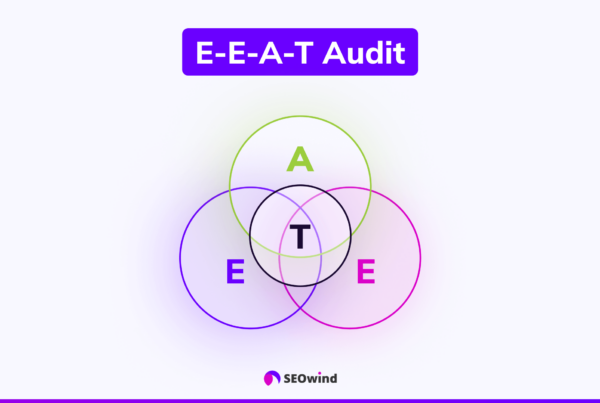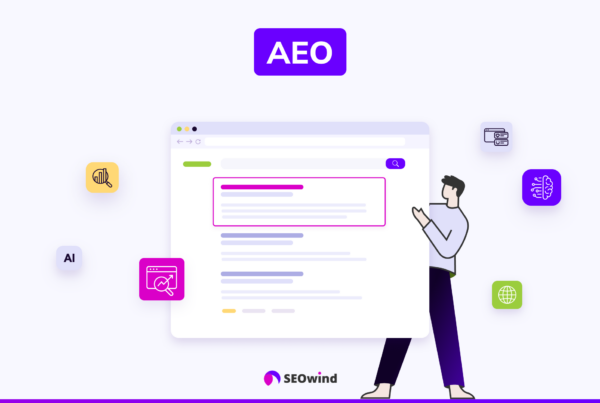Imagine having a tireless writing companion who never sleeps, never gets writer’s block, and can churn out content at lightning speed. That’s the promise of artificial intelligence writers. AI writing tools are revolutionizing the way we create and communicate. Whether you’re a marketer drowning in copy requests, a novelist struggling with plot twists, or a student facing endless essays, AI writing assistants are here to lend a helping hand – or, rather, a helping algorithm.
Categorizing the AI Writing Assistants

As the field of AI writing tools expands, it’s becoming increasingly important to understand the different categories into which these assistants. Each type of AI writing tool is designed to cater to specific needs and writing styles. Let’s break down these categories to help navigate the numerous AI writing assistants available to you.
For Long-form Content Creation
AI tools for writers have become indispensable allies when crafting lengthy content. These systems are designed to tackle the challenges of long-form writing, such as maintaining coherence, developing ideas, and ensuring a consistent tone.
Long-form AI writing assistants excel at:
- Generating comprehensive outlines for articles, blog posts, and even ebooks
- Expanding on key points with relevant information and examples
- Suggesting transitions between paragraphs to maintain an effective flow
- Offering alternative phrasing to avoid repetition
These tools can be game-changers for content creators who regularly produce in-depth articles, reports, or whitepapers. By leveraging AI, writers can overcome the initial hurdle of getting started and maintain momentum throughout the writing process.
For Short-form Copywriting and Marketing Content
When it comes to marketing and advertising, concise and impactful copy is king. AI writing software for short-form content is specifically tailored to create attention-grabbing headlines, snappy social media posts, and compelling ad copy. These tools are designed to understand the nuances of persuasive writing and can generate multiple variations of copy in seconds.
Key features of short-form AI writing tools include:
- Headline generators that use proven formulas for engagement
- Ad copy creators that adapt to different platforms (e.g., Facebook, Google Ads)
- Email subject line optimizers
- Product description generators
Marketers and copywriters can use these AI assistants to brainstorm ideas quickly, overcome creative blocks, and produce a high volume of copy variations for A/B testing.
Specialized AI for Academic and Technical Writing
The world of academia and technical writing presents unique challenges that require specialized writing tools. AI software for writers in these fields is equipped to handle complex terminology, adhere to strict formatting guidelines, and maintain the formal tone expected in scholarly material.
These specialized AI writing assistants offer:
- Citation and reference management
- Plagiarism detection and paraphrasing suggestions
- Technical jargon and terminology assistance
- Structure and formatting guidance for research papers and reports
These tools can significantly reduce the time spent on formatting and citations for students, researchers, and technical writers, allowing users to focus on the purpose and analysis of their work.
AI for Fiction and Creative Writing
The realm of fiction and creative writing might seem like the last frontier for AI, but innovative writing tools are making inroads here too. These AI assistants are designed to spark creativity, help with character development, and even suggest plot twists.
Creative AI writing tools can:
- Generate character backstories and personality traits
- Offer dialogue suggestions based on character profiles
- Provide prompts to overcome writer’s block
- Assist with world-building for the fantasy and sci-fi genres
While these tools won’t replace human creativity, they can serve as valuable brainstorming partners and help writers explore new directions in their storytelling.
AI for code writing
AI is also making waves with code-writing assistants. This variation of automated writing helps programmers code more efficiently, debug issues, and even learn new programming languages.
AI code writing tools offer:
- Code completion and suggestions
- Automatic bug detection and fixing
- Code refactoring recommendations
- Natural language to code translation
For developers, these AI assistants can significantly accelerate the coding process, reduce errors, and help maintain consistency across large codebases. They’re helpful for both beginners learning to code and experienced developers tackling complex projects.
As we’ve seen, the best AI writers come in many forms, each tailored to specific needs. From long-form content to code writing, AI assistants are transforming how we approach the written word. By understanding these categories, you can choose the right tool to enhance your writing process, boost productivity, and unlock new levels of creativity.
Benefits of Using AI for Writing

More writers are discovering how to use AI to improve their writing and boost productivity. Incorporating AI into your writing process has numerous benefits and can significantly transform your workflow.
Time-saving Aspects and Efficiency Gains
One of the most compelling reasons to embrace writing with AI is its remarkable time savings. When AI writes for you, you’re employing a tireless assistant that can work around the clock. This efficiency boost can be a game-changer for writers facing tight deadlines or managing multiple projects simultaneously.
Here’s how AI writes to save you time:
- Rapid content generation: AI can produce draft content in minutes, giving you a solid starting point to refine and personalize the final result.
- Automated research: Many AI tools can gather and summarize information on various topics, reducing research time.
- Instant editing suggestions: AI-powered grammar and style checkers provide real-time feedback, reducing the time spent on proofreading.
- Quick iterations: Do you need multiple versions of an asset? AI can generate variations swiftly, allowing for faster A/B testing.
By leveraging these time-saving features, writers can focus more on strategic thinking, creative ideation, and fine-tuning their message rather than getting bogged down in the initial drafting process.
Quality of Output: Can AI Match Human Writers?
A common concern when considering AI writing assistants is whether the quality can match that of human writers. While AI has made significant strides in generating coherent and contextually relevant content, the question of quality is nuanced and depends on various factors.
The strengths of AI-generated content include:
- Consistency: AI maintains a consistent tone and style throughout long pieces, which can be challenging for human writers.
- Factual accuracy: When properly trained, AI can access and incorporate a vast amount of up-to-date information.
- Adaptability: AI can quickly adjust to different writing styles and formats, from formal academic papers to casual blog posts.
Meanwhile, human writers still excel at:
- Emotional depth: Humans can infuse writing with genuine emotion and personal experiences, which AI struggles to replicate.
- Creative originality: While AI can combine existing ideas in new ways, truly groundbreaking creativity remains a human ability.
- Nuanced understanding: Human writers can pick up on subtle contextual cues and cultural nuances that may elude AI.
AI writes best when used as a collaborative tool rather than a replacement for human writers. By combining its efficiency and data-processing capabilities with human creativity and insight, writers can achieve a level of quality that surpasses what either could produce alone.
For instance, a writer might use AI to generate an initial draft, conduct research, and suggest improvements while applying their own expertise to refine the content, add personal touches, and ensure the final result resonates with the intended audience.
However, it’s important to note that the quality of AI-generated content heavily depends on the input and guidance provided by human users. The more specific and detailed the instructions, the better the output. This underscores the importance of developing skills in effectively prompting and directing AI tools to achieve the desired results.
In conclusion, while AI may not fully match human writers in every aspect, it has the potential to elevate the writing process. By embracing AI as an assistant, writers can enhance productivity and focus on adding the uniquely human elements that make their writing exceptional.
Key Features to Look for in an AI Writing Assistant
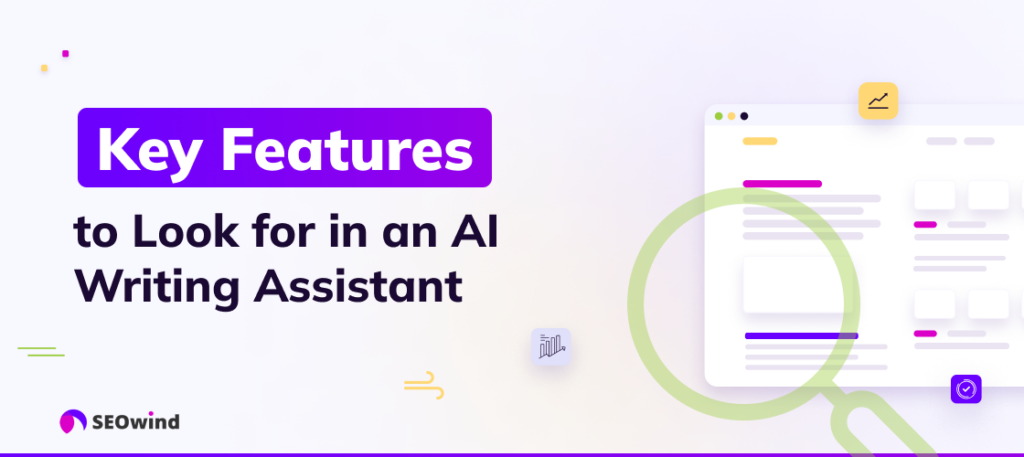
When choosing the best AI writing tool for your needs, it’s crucial to consider several vital features that can significantly enhance your writing process. An effective AI writer should generate content and support your research, organization, and brand consistency. Let’s explore the essential features that make an AI assistant truly valuable.
Research capabilities
One of the most powerful features of an automated writing solution is its ability to conduct comprehensive research. This capability can save writers hours of time and provide a solid foundation for creating well-informed content.
For example, SEOwind exemplifies this feature by offering in-depth content and keyword research capabilities. It collects and analyzes data on:
- SEO & SERP data for top-ranking pages
- Their titles and meta descriptions, outlines, length, and keywords
- Keywords clustered with AI
- Relevant questions from Google, Quora, and Reddit
- Key stats and quotes
- Competitor keywords
Outline capabilities
A robust outline is the backbone of any well-structured piece of writing. The best AI writing tool should offer strong outline capabilities to help writers organize their thoughts and create a coherent flow of information.
Key outline features to consider include:
- Automatic generation of structured outlines based on your topic
- Flexibility to customize and rearrange outline elements
- Suggestions for subheadings and key points to cover
- Integration of research findings into the outline structure
SEOwind’s approach to outline creation is particularly noteworthy. By leveraging its research capabilities, it helps users create comprehensive content outlines and briefs informed by SEO data and content analysis. This ensures that the resulting content is well-structured and optimized for search engines and audience engagement.
Feeding context
The ability to feed context into your AI writing assistant is crucial for producing relevant and accurate content. This feature allows you to provide background information, specific requirements, and any necessary constraints to guide the AI’s output.
Look for an AI assistant writer that offers:
- User-friendly interfaces for inputting context and guidelines
- The ability to understand and incorporate industry-specific terminology
- Options to specify tone, style, and target audience
- The flexibility to include brand-specific information and preferences
SEOwind allows users to define their tone of voice and provide information about their company, services, and target audience. This ensures that the AI-generated content is tailored to the brand’s unique identity and goals.
Brand voice
Maintaining a consistent brand voice across all content is essential for building brand recognition and trust. An effective AI writing assistant should be able to adapt to and replicate your brand’s unique tone and style.
Features to look for in this category include:
- Customizable voice and tone settings
- An ability to learn from existing brand content
- Consistency checks to ensure adherence to brand guidelines
- Options to create and save multiple brand voice profiles
SEOwind’s approach to brand voice is particularly innovative.
By combining Retrieval-Augmented Generation (RAG) with a Multi-Agent AI system, it creates a human-like content creation process that can effectively capture and maintain a brand’s unique voice. This sophisticated system mimics the collaborative effort of a human marketing team, ensuring that the content produced is on-brand and meets Experience, Expertise, Authoritativeness, and Trustworthiness (E-E-A-T) standards.
As Ravi Narayanan, VP of Insights and Analytics at Nisum, wisely noted, “AI is a mirror, reflecting not only our intellect, but our values and fears.” This reflection is particularly evident in how AI writing assistants can be tailored to embody a brand’s values and voice, creating content that resonates deeply with the intended audience.
When selecting an AI writing assistant, it is crucial to look beyond basic text generation capabilities. The best tools, like SEOwind, offer a comprehensive suite of features that support the entire content creation process, from research and outlining to maintaining brand consistency. Choosing a tool that excels in these critical areas significantly enhances your writing efficiency and quality, allowing you to create content that stands out in today’s competitive digital landscape.
Comparative Analysis of Top AI Writing Tools
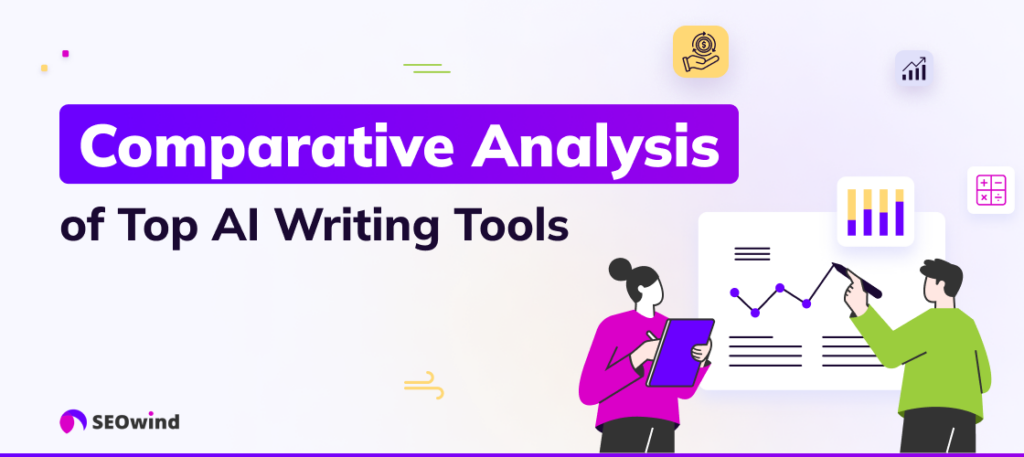
As the demand for AI-powered writing solutions grows, the market for the best AI writing tools has expanded rapidly. According to CompTIA’s IT Industry Outlook 2024 report, “22% of firms are aggressively pursuing the integration of AI across a wide variety of technology products and business workflows.” This trend is reflected in the burgeoning AI content-writing software industry. With the global AI market size expected to reach $407 billion by 2027, it’s clear that AI writing tools are here to stay and evolve. Let’s examine some of the best AI platforms for writing, including their features, pros, and cons.
SEOwind: Quality articles research-based

SEOwind is one of the best AI content writing tools, particularly for those focused on creating SEO-optimized, research-based content.
SEOwind Features:
- Comprehensive SEO and content research capabilities
- Long-form AI writing with a focus on quality and traffic generation
- AI-powered Content Updates
- CyborgMethod™ for human-AI collaboration
- Multi-Agent AI system mimicking a human marketing team
SEOwind Pros:
- Produces high-quality, research-backed content
- Integrates SEO data seamlessly into the writing process
- Allows for customization of tone and brand voice
- Utilizes advanced AI models for diverse tasks
- Updates content based on research and data
SEOwind Cons:
- Primarily focused on long-form content, which may not suit all needs
SEOwind’s approach of combining RAG with Multi-Agent AI for human-like content creation sets it apart in the crowded field of AI writing assistants. Its emphasis on research and SEO optimization makes it an excellent choice for content marketers and businesses looking to drive organic traffic.
Jasper: Comprehensive Review and Use-Cases
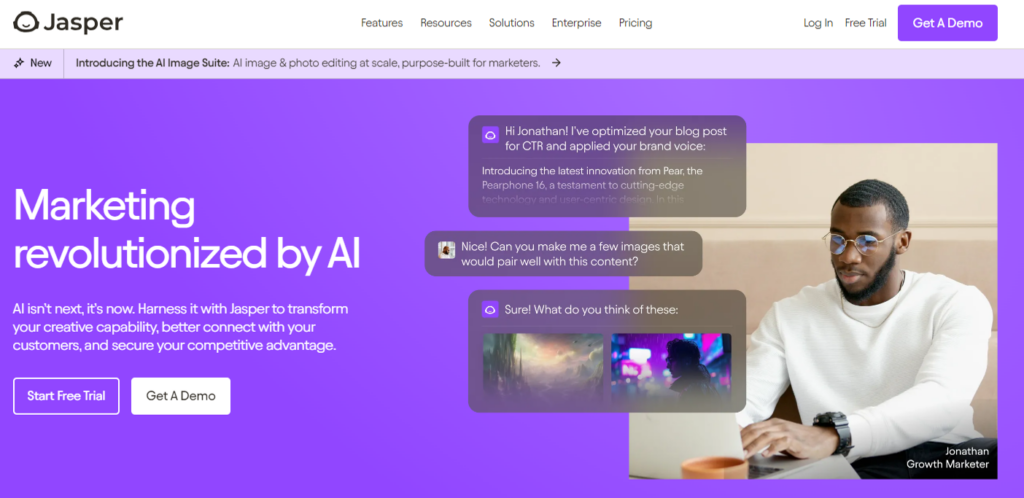
Jasper (formerly Jarvis) is widely recognized as one of the best AI writing tools available and is known for its versatility and user-friendly interface.
Jasper Features:
- Wide range of templates for various content types
- Integration with Surfer SEO for optimization
- Plagiarism checker
- Team collaboration features
Jasper Pros:
- Versatile and suitable for multiple content formats
- User-friendly interface with a short learning curve
- Regular updates and new features
- Strong community and support
Jasper Cons:
- Can be expensive for individual users or small teams
- Output quality can vary depending on the input and chosen template
Jasper excels at providing a comprehensive solution for various content needs, from blog posts to social media content, making it a popular choice among marketers and content creators.
Rytr: Features, Pricing, and User Experience

Rytr is known for its affordability and ease of use, making it an attractive option for beginners and budget-conscious users.
Rytr Features:
- 30+ use cases and templates
- Multiple language support
- Tone and voice customization
- Built-in plagiarism checker
Rytr Pros:
- Very affordable, with a generous free plan
- Easy to use, ideal for beginners
- Supports multiple languages
- Regular updates and improvements
Rytr Cons:
- Output quality may not match more advanced tools
- Limited customization options compared to premium alternatives
Rytr’s combination of affordability and ease of use makes it an excellent entry point for those new to AI content writing tools.
Copy.ai: Bridging Creativity and AI Efficiency
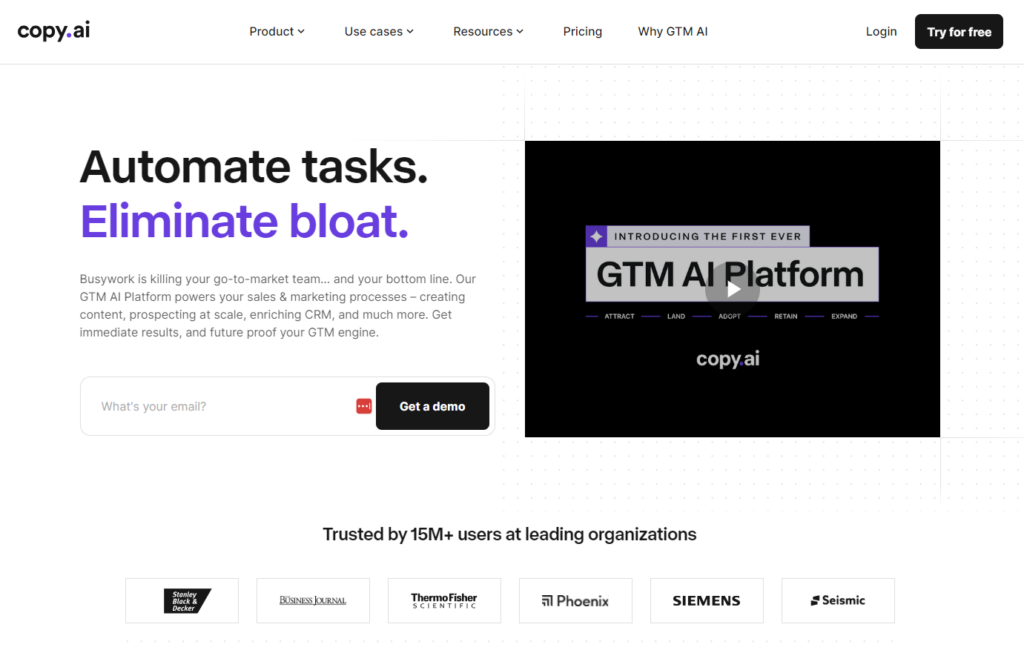
Copy.ai focuses on providing creative solutions for marketers and copywriters, emphasizing its ability to generate innovative ideas quickly.
Copy.ai Features:
- Extensive template library for various marketing needs
- Idea generation tools
- Multi-language support
- Team collaboration features
Copy.ai Pros:
- Excels at generating creative marketing copy
- User-friendly interface with a low learning curve
- Offers a free plan with generous features
- Regular updates with new templates and features
Copy.ai Cons:
- May require more human editing for longer-form content
- Some users report inconsistency in output quality
Copy.ai’s strength lies in its ability to quickly generate creative marketing copy, making it a favorite among digital marketers and small business owners.
Writesonic: The Future of GPT-4 in Writing
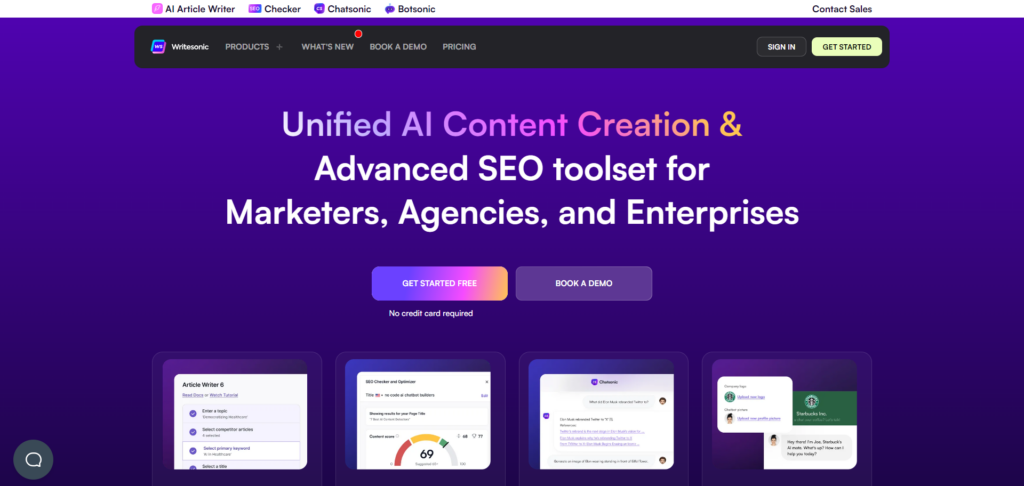
Writesonic leverages advanced AI models, including GPT-4, to generate high-quality content in various formats.
Writesonic Features:
- GPT-4 powered content creation
- AI article writer 5.0 for long-form content
- Factual writing with cited sources
- Multilingual support
Writesonic Pros:
- Produces high-quality, factual content
- Offers a wide range of content types
- Integrates advanced AI models for improved output
- Competitive pricing with a free trial
Writesonic Cons:
- Higher-tier plans are required for access to the most advanced features
- Some users report occasional inconsistencies in longer articles
Writesonic’s use of cutting-edge AI technology positions it as a forward-thinking option in the AI writing tool market.
Sudowrite for Fiction Writers: Revolutionizing Storytelling
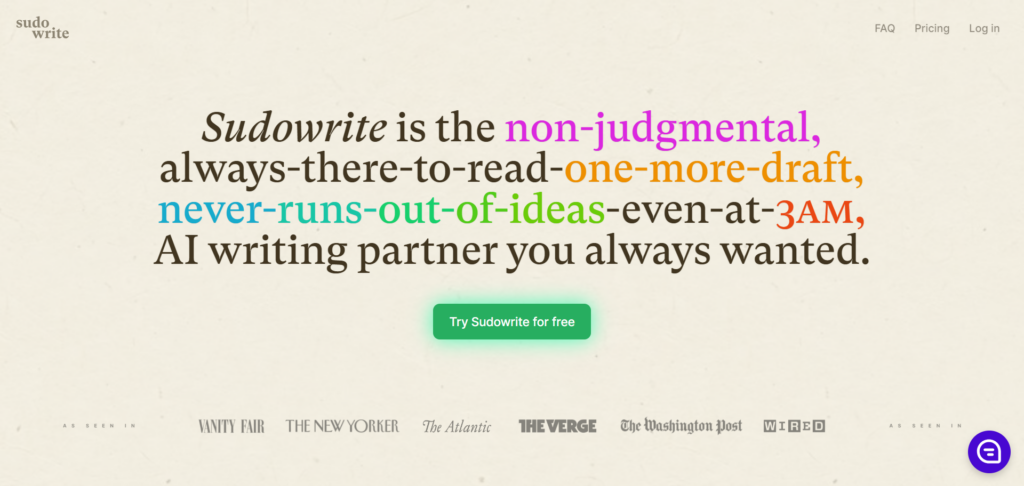
Sudowrite caters specifically to fiction writers, offering unique features designed to assist in the creative writing process.
Sudowrite Features:
- Story plotting assistance
- Character development tools
- Descriptive writing enhancement
- Writer’s block solutions
Sudowrite Pros:
- Tailored specifically for creative writing needs
- Innovative features for plot and character development
- Helps overcome writer’s block
- Preserves the author’s unique voice
Sudowrite Cons:
- Niche focus may not suit all content creation needs
- Pricing may be high for casual writers
Sudowrite’s specialized approach makes it a standout choice for fiction authors looking to enhance their creative process with AI assistance.
Anyword: Tailored for Marketing Copy Excellence
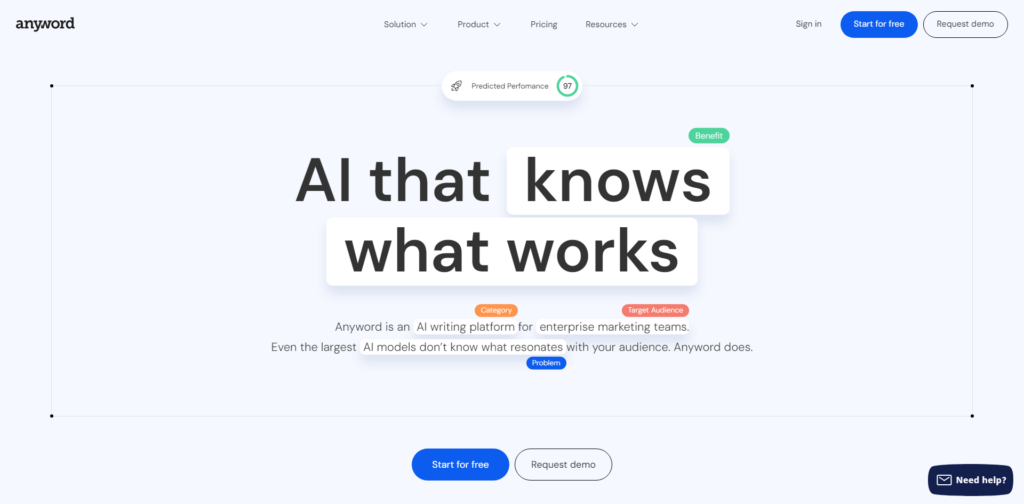
Anyword focuses on data-driven copywriting, particularly for marketing and advertising purposes.
Anyword Features:
- AI-powered copywriting with performance prediction
- Custom-trained AI models for brand voice
- A/B testing capabilities
- Integration with major ad platforms
Anyword Pros:
- Data-driven approach to copywriting
- Excellent for ad copy and short-form marketing content
- Customizable to match brand voice and style
- Provides performance predictions for generated copy
Anyword Cons:
- Primarily focused on marketing copy, may not be suitable for all content types
- Higher pricing tiers for advanced features
Anyword’s data-driven approach and focus on marketing copy make it an excellent choice for businesses looking to optimize their advertising and promotional content.
The landscape of AI writing tools is diverse, with each platform offering unique strengths. From SEOwind’s research-based approach to Sudowrite’s fiction focus, there’s an AI content writing tool for every need. As the AI market continues to grow and evolve, we expect these tools to become even more sophisticated, further revolutionizing content creation.
